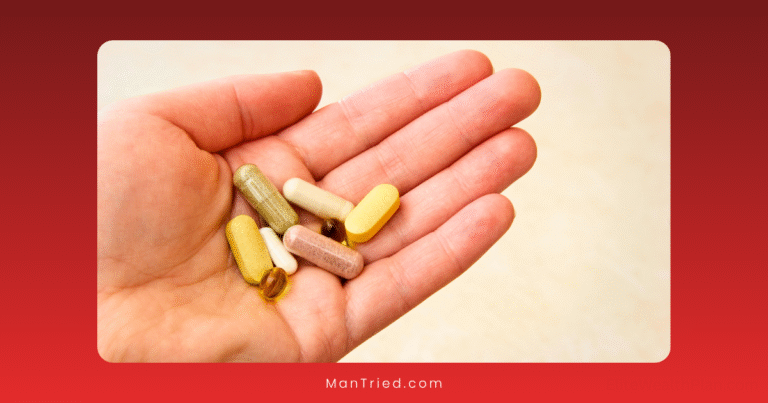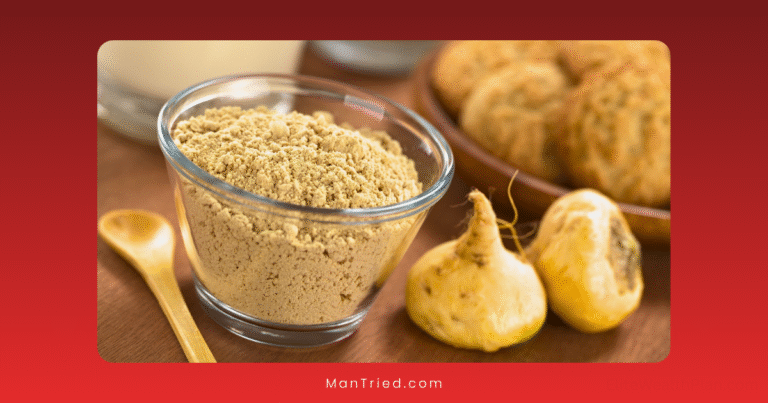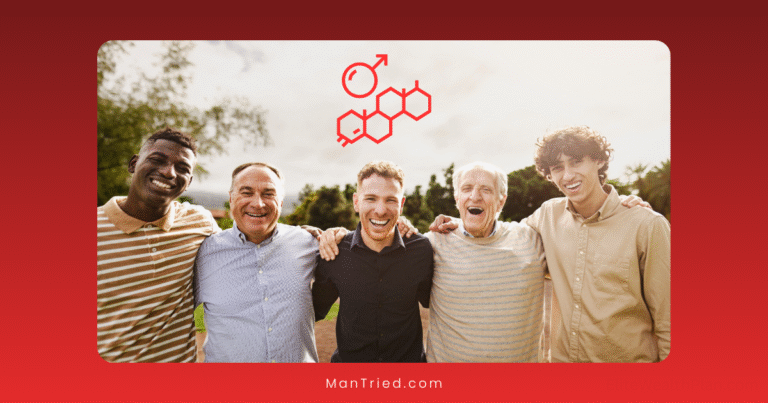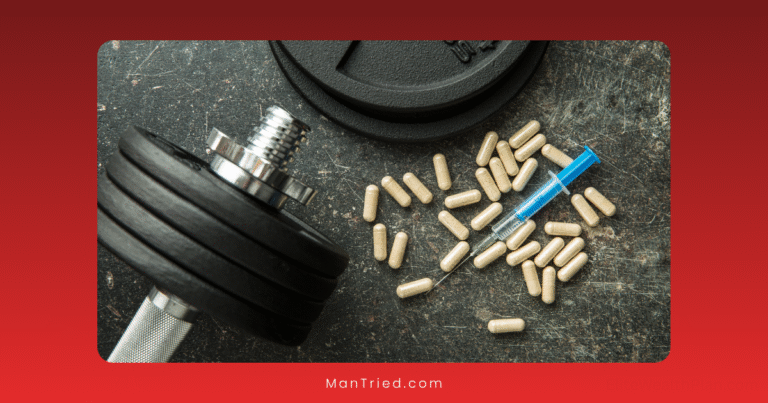Tribulus Terrestris and Testosterone: Separating Fact from Fiction
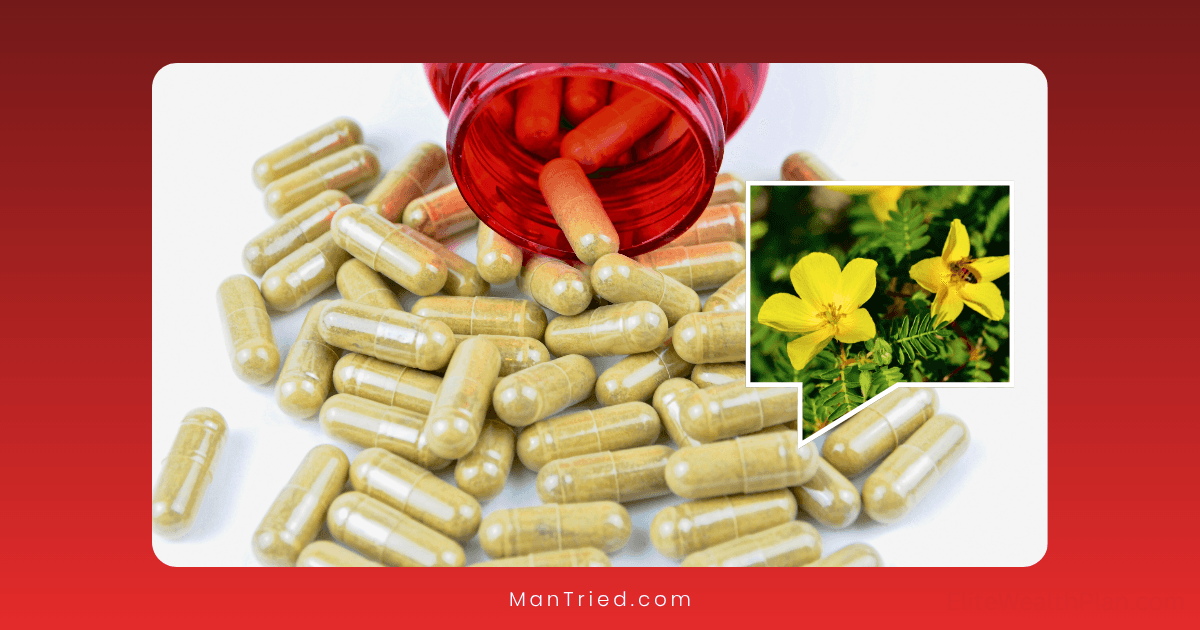
In the world of natural supplements, few herbs are surrounded by as much controversy and conflicting information as Tribulus terrestris. Marketed variously as a testosterone booster, libido enhancer, and athletic performance aid, this spiny plant has become a fixture in supplement stores worldwide. But what does the science actually say about these claims? Let’s cut through the marketing hype and examine what’s fact and what’s fiction about this popular herb.
The Ancient Roots of Tribulus
Before diving into modern research, it’s worth understanding the rich historical context of Tribulus terrestris use across different traditional medicine systems.
A Plant of Many Names and Traditions
Known variously as puncture vine, caltrop, goat’s head, or devil’s thorn in English, Tribulus terrestris grows naturally in subtropical regions spanning from southern Europe and Africa to eastern and western Asia. Its distinctive spiny fruits—which can puncture bicycle tires and injure bare feet—belie its long-standing reputation as a healing herb.
According to a comprehensive review published in PMC, Tribulus has been used for thousands of years in various traditional medicine systems:
- Chinese Medicine: Listed as a top-grade medicine in the ancient text “Shen Nong Ben Cao Jing,” Tribulus fruits were traditionally used for tonifying the kidneys (which in TCM relate to sexual and reproductive health), as a diuretic, and as a cough expectorant.
- Ayurvedic Medicine: In India’s traditional medical system, Tribulus (known as “Gokshur”) has been prescribed for infertility, impotence, erectile dysfunction, and low libido, as well as for urinary disorders and as a general tonic.
- Middle Eastern and African Traditions: In countries like Sudan, Tribulus has been used for treating nephritis and inflammatory disorders, while in other regions it served as a diuretic and blood pressure regulator.
This widespread traditional use across multiple medical systems suggests that Tribulus may indeed possess bioactive properties worth investigating with modern scientific methods.
The Chemistry Behind the Claims
The biological effects of Tribulus terrestris are primarily attributed to its rich content of steroidal saponins and flavonoids. Understanding these compounds helps explain both the traditional uses and modern research findings.
Saponins: The Star Players
According to research published in 2024, saponins are considered the most important bioactive compounds in Tribulus. A detailed analysis has identified 108 different steroidal saponins in the plant, including:
- Protodioscin: Often considered the primary active compound, particularly for sexual health effects
- Protogracillin: Another key saponin linked to aphrodisiac properties
- Various other saponins derived from compounds like tigogenin, diosgenin, and gitogenin
Interestingly, the concentration and composition of these saponins can vary significantly depending on where the plant is grown. This geographical variation may partly explain the inconsistent results seen in some studies.
Flavonoids and Other Compounds
Beyond saponins, Tribulus contains:
- Flavonoids: Primarily derivatives of quercetin, kaempferol, and isorhamnetin, which contribute antioxidant properties
- Alkaloids: Compounds that may affect the nervous system
- Phytosterols: Plant sterols that can influence hormone pathways
This complex chemical profile creates multiple potential mechanisms of action, making Tribulus a versatile but sometimes unpredictable herbal remedy.
Claim #1: Testosterone Boosting – Fact or Fiction?
Perhaps the most common claim about Tribulus terrestris is that it increases testosterone levels, making it popular among bodybuilders and men seeking hormone support. But what does the evidence say?
The Research Evidence
A systematic review published in PubMed analyzed 10 studies with 483 participants and found:
- Eight out of ten studies showed no significant changes in testosterone levels after Tribulus supplementation
- Only two studies demonstrated significant increases in total testosterone, and these were modest (60-70 ng/dL) and occurred specifically in men with hypogonadism (clinically low testosterone)
Similarly, a review of 12 studies cited by Healthline found no significant testosterone increases across various populations, ages, and health statuses.
The Verdict: Mostly Fiction
For healthy men with normal testosterone levels, the claim that Tribulus significantly boosts testosterone appears to be largely fiction. The evidence suggests:
- For healthy men: Minimal to no effect on testosterone levels
- For men with hypogonadism: Possible modest increases, but less effective than medical treatments
- For athletes: No reliable testosterone-boosting effect
This contradicts both marketing claims and the widespread gym lore about Tribulus being a natural “test booster.”
Claim #2: Sexual Function Enhancement – Fact or Fiction?
Despite the lack of evidence for testosterone boosting, Tribulus may still benefit sexual function through other mechanisms. Let’s examine the evidence.
For Men: Erectile Function and Libido
According to the systematic review on PubMed:
- Three out of five studies assessing erectile dysfunction reported improvements with Tribulus supplementation
- Healthline reports that men taking 750-1,500 mg daily for two months experienced a 79% increase in sexual desire
- A pilot study mentioned by Memorial Sloan Kettering Cancer Center found significant improvements in erectile function in men with partial androgen deficiency
The mechanism may involve nitric oxide release and improved blood flow rather than testosterone increases.
For Women: Desire and Satisfaction
The evidence for women is particularly interesting:
- Approximately 67% of women with low libido experienced increased sexual desire after taking 500-1,500 mg of Tribulus for 90 days, according to Healthline
- WebMD reports that Tribulus may improve sexual satisfaction in females with sexual dysfunction or low sexual desire
- A 2021 study assessed effects on female sexual dysfunction and clitoral vascularization with promising results
The Verdict: Partial Fact
While not a miracle cure, the evidence suggests Tribulus may genuinely help with:
- Sexual desire: Moderate evidence supports benefits for both men and women
- Erectile function: Some evidence of benefit, particularly for men with mild to moderate ED
- Sexual satisfaction: Several studies show improvements in overall satisfaction
These effects appear to occur independently of any significant changes in testosterone levels, suggesting other mechanisms are at work.
Claim #3: Athletic Performance Enhancement – Fact or Fiction?
Many athletes and bodybuilders use Tribulus in hopes of gaining an edge in performance, recovery, or muscle building. Does the evidence support this use?
The Research Evidence
The consensus from multiple sources is clear:
- WebMD states there is “no good scientific evidence” supporting the use of Tribulus for athletic performance enhancement
- Healthline reports that Tribulus does not appear to improve body composition or exercise performance beyond placebo effects
- Memorial Sloan Kettering notes that clinical studies have not found significant improvements in muscle strength or mass
The Verdict: Fiction
The claim that Tribulus enhances athletic performance, builds muscle, or improves body composition appears to be fiction. Athletes using it for these purposes are likely experiencing placebo effects or benefits from other ingredients in combination supplements.
Claim #4: Other Health Benefits – Fact or Fiction?
Beyond sexual health and performance claims, Tribulus has been studied for various other health applications. Let’s examine some of these lesser-known potential benefits.
Blood Sugar and Diabetes Management
According to Healthline:
- A study with 98 women taking 1,000 mg of Tribulus daily showed lower blood sugar levels after three months compared to placebo
- Research published in PMC indicates that Tribulus has hypoglycemic effects, significantly reducing serum glucose and triglyceride levels in diabetic models
Cardiovascular Health
Several sources note potential cardiovascular benefits:
- Tribulus may help manage cholesterol levels in people with type 2 diabetes
- The herb has shown antihypertensive effects through arterial smooth muscle relaxation and ACE inhibition
- Saponins may protect against atherosclerosis according to Memorial Sloan Kettering
Anti-inflammatory and Antioxidant Effects
Research from 2024 highlights:
- Significant anti-inflammatory properties in various animal models
- Antioxidant effects that may protect against oxidative stress
- Potential applications for inflammatory conditions
The Verdict: Partial Fact
The evidence for these additional health benefits is preliminary but promising:
- Blood sugar management: Moderate evidence supports benefits
- Cardiovascular health: Some supporting evidence, but more research needed
- Anti-inflammatory effects: Well-supported in animal studies, but human research is limited
These areas represent the most promising directions for future Tribulus research, potentially beyond its more marketed sexual health applications.
Understanding Mechanism of Action
If Tribulus doesn’t significantly increase testosterone in healthy individuals, how might it produce its observed effects on sexual function and other health parameters?
Beyond Testosterone: Alternative Mechanisms
Research suggests several possible mechanisms:
- Nitric Oxide Production: Tribulus may enhance nitric oxide release, improving blood flow to genital tissues—similar to how medications like Viagra work, but less potent.
- Nervous System Effects: Some compounds in Tribulus affect the central and peripheral nervous systems, potentially enhancing sensation and arousal.
- Anti-inflammatory Action: By reducing inflammation, Tribulus may improve overall vascular health and function.
- Adaptogenic Properties: Like many traditional herbs, Tribulus may help the body adapt to stress, indirectly supporting sexual function and general wellbeing.
- Mild Hormonal Modulation: While not dramatically increasing testosterone, Tribulus may subtly influence the balance of various hormones, including estrogen and luteinizing hormone.
Understanding these mechanisms helps explain why Tribulus might benefit sexual function without significantly altering testosterone levels.
Practical Considerations: Using Tribulus Effectively
If you’re considering trying Tribulus terrestris, here’s what the research suggests about effective usage:
Dosage and Timing
Based on clinical studies:
- Effective dosage range: 750-1,500 mg daily
- For sexual function: 750-1,500 mg daily for at least 2-3 months
- For blood sugar management: Around 1,000 mg daily
- Duration of use: Most studies ran for 2-3 months; long-term safety beyond this is less established
Product Selection
Not all Tribulus products are created equal:
- Standardization: Look for products standardized to contain a specific percentage of saponins (particularly protodioscin)
- Geographic source: Bulgarian or Indian Tribulus is often preferred due to higher saponin content
- Form: Available as capsules, tablets, powders, and tinctures; capsules and tablets offer the most consistent dosing
Cycling and Combinations
Some practitioners recommend:
- Cycling: Taking Tribulus for 8-12 weeks, then taking a 2-4 week break
- Combinations: For sexual health, Tribulus is sometimes combined with other herbs like maca or horny goat weed, though research on these combinations is limited
Safety Profile: Understanding the Risks
While generally considered safe for most adults when taken in appropriate doses, Tribulus does have some potential side effects and contraindications.
Common Side Effects
According to WebMD and other sources:
- Stomach pain or discomfort
- Cramping
- Diarrhea
- Sleep disturbances (in some individuals)
Serious Concerns and Contraindications
More serious considerations include:
- Pregnancy: Animal studies suggest Tribulus may harm fetal development; pregnant women should avoid it
- Hormone-sensitive conditions: Those with hormone-sensitive cancers or conditions should consult healthcare providers before use
- Surgery: Tribulus might affect blood sugar and blood pressure, so it should be discontinued at least two weeks before scheduled surgery
- Medication interactions: May interact with diabetes medications, blood pressure drugs, and certain other medications
Drug Interactions
Potential interactions to be aware of:
- Antidiabetic medications: May enhance blood sugar-lowering effects
- Antihypertensive drugs: May increase blood pressure-lowering effects
- Diuretics: May enhance diuretic effects
- Lithium: Theoretical risk of increasing lithium levels
Always consult with a healthcare provider before starting Tribulus, especially if you have existing health conditions or take medications.
Quality Control and Supplement Selection
One of the challenges with Tribulus terrestris supplements is significant variation in quality and potency. According to WebMD, both quality and active ingredient content can vary dramatically among manufacturers.
What to Look For
When selecting a Tribulus supplement, consider these factors:
- Standardization: The best products are standardized to contain a specific percentage of saponins (typically 45-60%)
- Third-party testing: Look for products tested by independent laboratories for purity and potency
- Reputable manufacturers: Choose established companies with good manufacturing practices
- Full disclosure: Product labels should clearly state the amount of Tribulus extract and the percentage of active compounds
- Country of origin: Bulgarian and Indian Tribulus are often considered superior due to higher saponin content
Red Flags to Avoid
Be wary of products that:
- Make extreme claims about testosterone boosting or muscle building
- Don’t specify the saponin content
- Are unusually cheap compared to other brands
- Combine Tribulus with numerous other ingredients in proprietary blends
- Lack clear dosage information
A 2024 study examining online Tribulus sales found that approximately 24% of websites selling Tribulus also offered potentially harmful substances, highlighting the importance of purchasing from reputable sources.
The Future of Tribulus Research
Despite mixed evidence for some of its most popular uses, Tribulus terrestris continues to interest researchers. Several promising areas for future investigation include:
Targeted Applications
- Sexual dysfunction in specific populations: More research on men and women with diagnosed sexual disorders
- Metabolic health: Further studies on diabetes and cardiovascular applications
- Inflammatory conditions: Clinical trials building on promising animal studies
Improved Formulations
- Standardized extracts: Developing more consistent extraction methods
- Combination therapies: Investigating synergistic effects with other herbs or medications
- Delivery systems: Exploring methods to improve bioavailability of active compounds
Long-term Safety
- Extended use studies: Most current research is limited to 2-3 months
- Population-specific safety: More data on safety in various age groups and health conditions
- Pharmacovigilance: Better tracking of adverse events in real-world usage
Conclusion: The Truth About Tribulus
After examining the evidence, we can separate fact from fiction regarding Tribulus terrestris:
The Facts:
- Tribulus has a long history of traditional use for sexual health and various other conditions
- It may improve sexual desire and function in both men and women, particularly those with existing sexual dysfunction
- Some evidence supports benefits for blood sugar management and cardiovascular health
- The herb appears generally safe for most adults when taken at recommended dosages for up to 90 days
- Specific saponins in Tribulus do have measurable biological effects
- The quality and origin of Tribulus products significantly impact their efficacy
The Fictions:
- Tribulus does not reliably increase testosterone levels in healthy individuals
- It does not enhance athletic performance, build muscle, or improve body composition
- It is not a “natural steroid” as sometimes claimed in marketing materials
- Long-term safety beyond 90 days is not well-established
- Not all products on the market contain effective amounts of active compounds
The Nuanced Reality:
Like many traditional herbs that have entered the modern supplement market, Tribulus terrestris exists in a space between complete validation and dismissal. The evidence suggests it may have legitimate benefits for specific conditions, particularly sexual function, but through mechanisms different than commonly advertised.
For consumers, this means approaching Tribulus with realistic expectations. It won’t transform your hormone profile or build muscle, but it might help address issues related to sexual desire or function, especially when these issues are already present.
The most responsible approach is to:
- Consult healthcare providers before starting Tribulus, especially if you have existing health conditions
- Choose quality products from reputable manufacturers
- Use appropriate dosages (typically 750-1,500 mg daily)
- Monitor your response and discontinue use if side effects occur
- Maintain realistic expectations about what the herb can and cannot do
By separating fact from fiction, we can appreciate Tribulus terrestris for what it actually offers rather than what marketing claims suggest. This ancient herb may not be the miracle supplement some claim, but it does appear to have legitimate applications that honor its long history in traditional medicine systems around the world.
Have you tried Tribulus terrestris? What was your experience? Share in the comments below!

